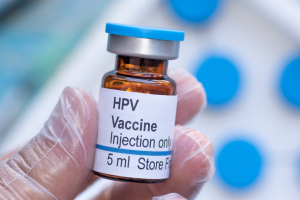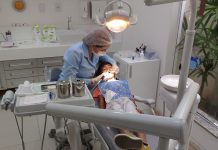 As women living in Alabama, we were concerned to learn recently that Alabama is among the top states with the highest cervical cancer cases and mortality rate. Thankfully, UAB Medicine is doing something about it, and we can too.
As women living in Alabama, we were concerned to learn recently that Alabama is among the top states with the highest cervical cancer cases and mortality rate. Thankfully, UAB Medicine is doing something about it, and we can too.
Last May, organizations, advocates, and health care providers across the state came together and developed a collaboration action plan to eliminate cervical cancer as a public health problem in Alabama by 2033. Alabama is the first and only state in the United States to have a plan like this in place! Many organizations are working together to make “Operation Wipe Out” a success, including UAB’s Department of Obstetrics and Gynecology, the O’Neal Comprehensive Cancer Center, TogetHER for Health, Rotary Club of Birmingham, and the Alabama Department of Public Health.
Isabel Scarinci, PhD, MPH serves as Vice-Chair for Global and Rural Health of UAB’s Department of Obstetrics and Gynecology and helps lead the initiative to end cervical cancer in Alabama. Dr. Scarinci has dedicated her career to research on cervical cancer, so we were eager to talk with her to learn more about it and how we can be a part of the movement to end it. Read on to find out the three main takeaways from our conversation.
1. The Good News – Cervical Cancer is Preventable!
We were really encouraged to learn from Dr. Scarinci that cervical cancer can be prevented. As she shared, “Most cervical cancer is caused by HPV (Human Papillomavirus), which is sexually transmitted. (This virus also causes other cancers, such as oropharyngeal and anal cancer among men and women, penile cancer in men, and vulvar and vaginal cancer among women.) It is a very common virus, and most people who are or have been sexually active get this virus.” Thankfully, because we know HPV can lead to cervical cancer, we can take measures before that happens.
2. How We Can Prevent Cervical Cancer:
Preventing cervical cancer comes down to two things – HPV vaccination and cervical cancer screening. Dr. Scarinci explained, “We have a safe and effective vaccine that can prevent children, adolescents, and young adults from getting the virus. HPV vaccination is recommended for children, adolescents and young adults (men and women) between the ages of 9 and 26 years of age. For children between the ages of 9 and 14, two doses are recommended. For adolescents and young adults between the ages of 15 and 26, three doses are recommended. The FDA also approved the vaccine for adults up to age 45 based on joint decision making with their health care provider.”
 In addition to HPV vaccination, cervical cancer screening plays a huge role in prevention. Dr. Scarinci recommends screening for all women ages 21 to 65. Screening is really significant because it can detect the presence of HPV or changes in the cells before cancer develops. While some cancer screening serves as detection, cervical cancer screening actually serves as prevention. It is also important to know that family history does not determine our risk for cervical cancer. All women are at risk, so screening is important for everyone. If the cervical cancer screening results are abnormal, women should definitely schedule a follow-up. Treatment is available to prevent cervical cancer from developing.
In addition to HPV vaccination, cervical cancer screening plays a huge role in prevention. Dr. Scarinci recommends screening for all women ages 21 to 65. Screening is really significant because it can detect the presence of HPV or changes in the cells before cancer develops. While some cancer screening serves as detection, cervical cancer screening actually serves as prevention. It is also important to know that family history does not determine our risk for cervical cancer. All women are at risk, so screening is important for everyone. If the cervical cancer screening results are abnormal, women should definitely schedule a follow-up. Treatment is available to prevent cervical cancer from developing.
3. HPV Vaccinations & Cervical Cancer Screening are Accessible.
More good news is that we have access to these preventative measures. Dr. Scarinci shared that HPV vaccination is covered by most health insurance plans among children under 19 years of age, and uninsured children can get the vaccine at no cost at the local health departments. Cervical cancer screening is covered by most health insurance plans, but low-income and uninsured women can get screened at no cost through the Alabama Breast and Cervical Cancer Early Detection Program.
We are thankful for “Operation Wipe Out” and all those involved who are promoting education and awareness in the fight to end cervical cancer. To learn more, visit Operation Wipe Out – TogetHER for Health and check out the documentary here.












